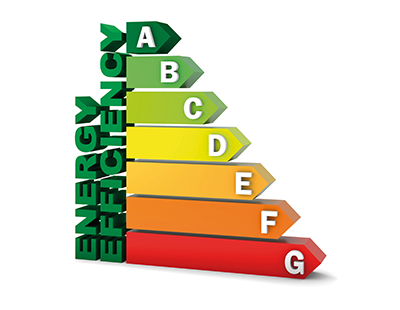Both were to the effect that the agents in question didn’t know Energy Performance Certificates came about, nor even cared much as up to now buyers rarely paid attention to them. And, amazingly, both even wondered whether EPCs were going to remain mandatory.
I doubt those agents will have the luxury of not caring for much longer.
It’s true enough that if buyers had actually taken notice of EPCs in the past, many older properties would have stuck on the market and there’s no evidence that’s been the case: but then we’ve all been guilty of not paying much attention to energy in our homes and lifestyles, and look where we are now.
An industry wariness of the EPC is nothing new. Almost 15 years ago when EPCs first began (yes, they are that old) there was widespread speculation they would be as short-lived as the Home Information Packs they were once part of.
So, for those uninitiated agents, here’s a short version of the long story of the EPC.
The EPC was a requirement of the EU Directive 2002/91/EC which happened as a response to the Kyoto Protocol of 1997. That protocol was the end product of a summit of nations held with the aim of reducing global emissions, so it was the COP26 of its day.
Consideration of how to implement EPCs in the UK came about, coincidentally, as the Labour government of the day was pondering how to improve the house buying process: thus for a few years EPCs were linked in the public eye, and for some agents, with the unpopular Home Information Packs, introduced in fits and starts in 2007.
In January 2010, an Estate Agent Today story showed how unpopular EPCs were as well, at least in some quarters. “Dodgy Energy Performance Certificates are being issued that are not worth the paper they are written on” penned the then editor of EAT, Ros Renshaw, referring to a report by the then-Ministry of Communities and Local Government warning accreditation schemes to improve their policing of the system.
Predictably, the comments beneath the story suggested a strongly-divided opinion within the agency industry as to the usefulness and necessity of EPCs.
Readers of a certain age - and that most definitely includes this writer, too - will remember the delight of agents a few months later in 2010 when the incoming Coalition government led by David Cameron and Nick Clegg suspended HIPs within days of coming to power.
However - and to the surprise of many agents - EPCs remained an inherent and mandatory part of the property sale, despite continued criticism. The HIP was gone forever but long live the EPC, suggested the new government.
That was perhaps the first time that some in the industry understood the certificates had a life and purpose outside the HIP.
Fast-forward six years to the EU Referendum and there were some voices suggesting that EPCs - an EU creation, after all - could go, or at least change radically, if the UK voted to Leave. Despite some Brexiteer promises saying the UK would strengthen its environmental credentials outside of the EU, through stricter EPCs, nothing substantial has changed in those five and a half years since the 52:48 referendum result.
This is despite an all-party recommendation just this year from the House of Commons Environmental Audit Committee that EPCs should be replaced by stricter measures because they are inadequate to support energy efficiency and low carbon heating targets.
So the fact that EPCs are still with us - and now an increasingly powerful part of the landscape for sales and rentals - shows their ability to survive 15 years of scepticism and criticism.
Indeed, they are probably better recognised now than ever before thanks to the advent of Minimum Energy Efficiency Regulations in the private rental sector and the galvanising effect of sharp energy price rises this winter, which will surely focus buyers’ attention more on energy efficiency in the immediate future.
So if there’s any agent hanging on to a hope that the certificates may be scrapped, it’s probably time to say they’re here to stay. And as for me, I expect typing ‘EPC’ will become an bigger part of my working life in the months and years ahead.
*Editor of Estate Agent Today, Letting Agent Today and Landlord Today, Graham can be found tweeting about all things property at @PropertyJourn







/SunakvsTruss02_400x310.png)






.jpg)
.jpg)






.png)



Join the conversation
Jump to latest comment and add your reply
Good piece, Graham. Not surprising that there are no comments from agents, because they have never understood the EPC and have therefore rubbished them. In 2007 estate agents were chosen to be the vehicle to promote EPCs, when selling or letting a property, but It was unfortunate that none had any training or understanding and therefore to this day, dismiss the humble EPC. As an ex-estate agent, turned EPC assessor, I can see both sides of the coin and have always said that agents have missed a trick, promoting them, looking for the positives, whether a poor or high Rating. Buyers and sellers aren't interested, because they don't understand them and the obvious person to ask is their estate agent, who is equally clueless, so dismisses the EPC, as rubbish. I only come into contact with sellers and make it a point of explaining the EPC, as they are likely to be buyers, too. Most welcome the understanding. Most have already jumped on cavity wall and loft insulation freebies, but asked why, the answer is usually 'because it was free', not' 'to make our home warmer and cheaper to run'. There has been help with boilers, ultimately saving 25-30% gas use and lower bills. The EPC is here to stay and is already effecting sales and mortgage offers. To the agents I say why not have a chat with your favoured EPC provider. Most will be only too happy to explain all!
Estate agents owe it to their clients, to understand, promote and explain the EPC. I challenge any agent to come on here and explain why they don't. I guarantee they have been talking about COP 26 and climate change!
Please login to comment